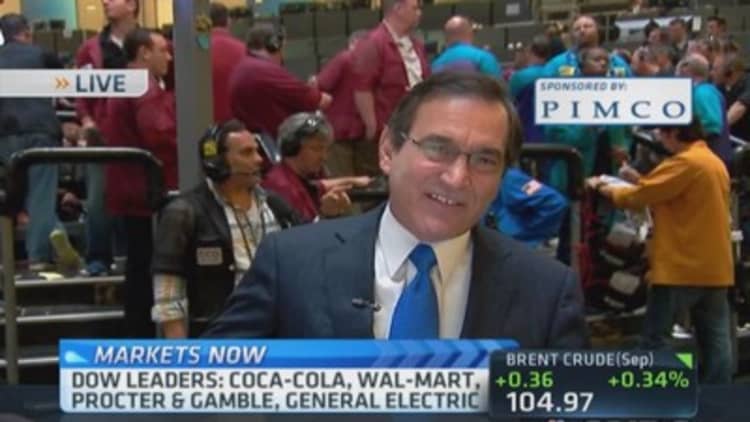Treasurys
U.S. Treasury bonds pared some gains after spiking earlier on Wednesday, with the 10-year yield dropping to its lowest yield since late May, as geopolitical uncertainty had investors seeking the perceived safety of government debt.
Benchmark U.S. stock indexes closed with modest gains Wednesday after the morning rally in Treasurys faded, with the 10-year Treasury note ending 4/32 higher in price at a yield of 2.47 percent. Earlier, the issue yielded 2.433 percent, its highest since May 28.
Thirty-year Treasury bonds were closed up 5/32 in price to yield 3.27 percent after touching a yield high on Tuesday of 3.33 percent during trading shaped by bullish U.S. economic data.
Investor concerns about the timing of Federal Reserve interest-rate hikes were receding, with fat differentials between European and U.S. yields proving increasingly alluring, portfolio managers said.
"The market is not so much, 'Oh my God, the Fed will be raising rates soon.' That is now off the table for a while," said Wilmer Stith, co-manager of the Wilmington Broad Market Bond fund in Baltimore, Maryland.
"Russia possibly being more aggressive over Ukraine is now on the table," Stith said. "U.S. Treasurys are very attractive on a yield basis with German 10-year bonds at 1.1 percent and ours now at 2.44."

After NATO said Russian troops were massing near Ukraine's border, European stocks fell 1.4 percent, while MSCI's world equity index was down 0.5 percent. Wall Street opened down.
German 10-year bond yields fell 7 basis points to a record low of 1.10 percent, on track for their biggest daily drop in nearly a year.
Heavy fighting has erupted in the Ukrainian city of Donetsk, as government forces try to take the area back from pro-Russian separatists. In addition, Poland's foreign minister warned on Tuesday that Russia was amassing battalion groups at the Ukrainian border.
"If Poland is indeed right that Russia is about to increase its presence in the east of Ukraine, buyers of all things risk will disappear fast as this is an undefinable event with an undefinable outcome for markets," said Evan Lucas, market strategist at IG, in a research note.
There are also rising concerns that Russia could retaliate against the sanctions enforced by the U.S. and Europe. A Russian business newspaper reported on Tuesday that Russia was considering banning European airlines flying through Russia airspace.
In the U.S., the Treasury is scheduled to release its August refunding statement on Wednesday. Auction sizes are seen unchanged at $27 billion in three-year notes, $24 billion in 10-year notes and $16 billion in 30-year bonds.
The Treasury has, however, been reducing auction sizes at the front end over the past few months.
"We believe levels are now appropriate given the outlook for borrowing needs," said Barclays analysts Ajay Rajadhyaksha and Dean Maki in a morning note.
"Keeping auction sizes unchanged at current levels would still result in lower net fixed-rate coupon issuance given the rising amount of maturing debt, thus allowing the short-term universe (Treasury-bills and floating-rate notes) to stabilize around current levels."
The government on Wednesday reported the nation's trade deficit came in at a less-than-expected $41.5 billion in June.
—By CNBC with Reuters

